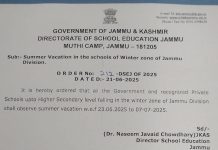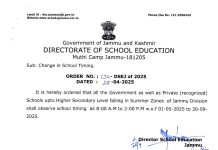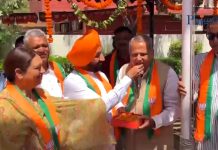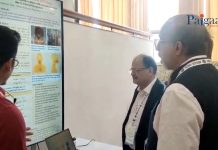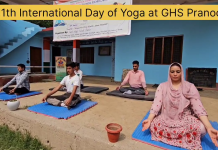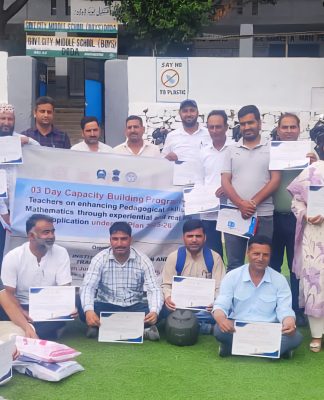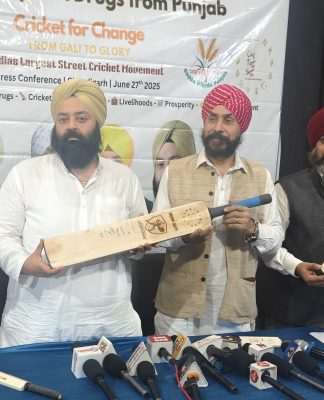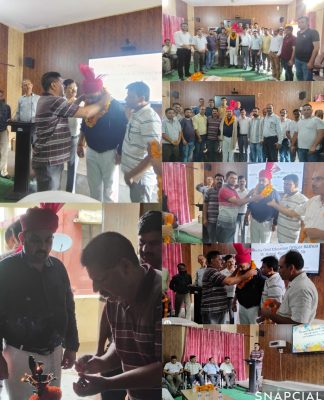Jammu: In the quiet solemnity of the chambers where policy meets purpose, the newly assumed Secretary to Government, School Education Department, Jammu and Kashmir Mr. Ram Niwas Sharma convened an Introductory-cum-Review Meeting with the senior functionaries of the Directorate of School Education, Jammu — a gathering both symbolic and strategic, ushering in a season of synergy and introspection.
Gracing the seasoned presence were Dr. Javaid Naseem Chowdhary, Director, School Education Jammu, flanked by a constellation of senior officials — Joint Director Ms. Subah Mehta, Personnel Officer Ms. Manisha, Chief Accounts Officer Ms. Monika Sharma, Senior Law Officer Mr. D P Chhibber, among others who shoulder the subtle yet significant machinery of educational administration in the region.the meeting marked a threshold moment — a point of poised reflection on the journey thus far and the road that lies ahead.
The Secretary, with the poise of purpose and the clarity of a reformer, engaged in a dialogue that was at once evaluative and visionary. Not merely content with the cold calculus of reports and numbers, the discourse leaned into the deeper rhythms of educational progress — efficiency, equity, and enlightenment. Discussions flowed like a tributary of insight — touching upon human resource optimisation, legal rectitude, administrative discipline, and financial
The deliberations traversed a vast intellectual terrain — from policy to personnel, from figures to philosophies. At the human resource level, attention was devoted to issues both chronic and current: transfers and postings, long-pending departmental promotions, the stasis of career stagnation, and the imperative task of filling vacant posts. These concerns, often mired in delay, were approached with clarity and compassion, seeking equilibrium between organisational necessity and individual dignity.
Equally pronounced was the focus on accountability — that sacred pillar which lends spine to every educational endeavour. Schools that have emerged as beacons — producing commendable results and cultivating environments of excellence — shall not go unnoticed. Their efforts, noble and silent, will be rewarded with due recognition and institutional encouragement. Conversely, those institutions where performance has faltered, where results have dipped beneath the expected curve, will undergo introspection. In such cases, accountability will not be avoided, but embraced — for it is only through honest reckoning that renewal begins.
The meeting, held under the contemplative gaze of duty and resolve, delved into matters both structural and spiritual in the realm of school education. With an unwavering emphasis on strengthening the organisational sinews and enhancing the working capabilities of the educational machinery, the discourse turned towards embedding accountability at every tier, ensuring that no link in the chain of responsibility remains lax or unobserved. The primacy of academics, especially at the primary and middle levels, was underscored with solemn urgency, as it is here that the soul of education is most delicately nurtured. The gathering echoed the ideal that the child must remain the luminous centre of the schooling cosmos, not as a passive recipient, but as the axis around which all pedagogical efforts must revolve. In the light of the recent declaration of results for Classes 10th and 12th, heartfelt commendation was extended to the schools and staff whose diligence bore commendable fruit, while it was resolved with equal earnestness that those institutions and educators whose results faltered shall be held accountable, not punitively, but in the spirit of introspective improvement. Concurrently, the concerns of the teaching community—pertaining to promotions, transfers, departmental adjustments, stagnation, and long-pending DPCs—were accorded serious consideration, reflecting a commitment not only to student welfare but also to the well-being and rightful progression of the educators who carry this noble burden.
Indeed, many such matters — subtle in form but weighty in consequence — were discussed with depth and determination. The Secretary urged that the Directorate not merely act as an administrative node, but as a nerve-centre of educational renaissance, where policy breathes and reforms walk on two feet — implementation and integrity.
The meeting concluded on a note of contemplative optimism. For though policy may be the scaffold, it is the people — the torchbearers within the Directorate — who must animate it with their integrity, insight, and indefatigable spirit.


